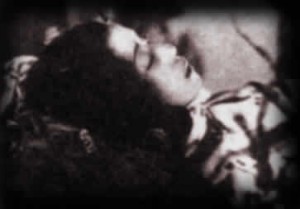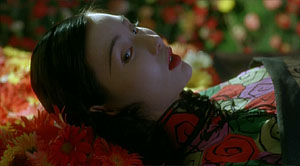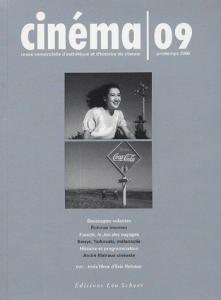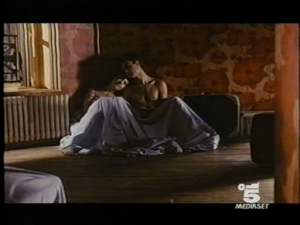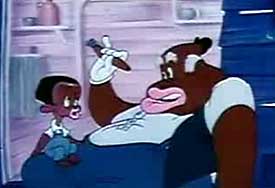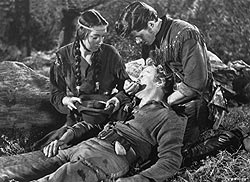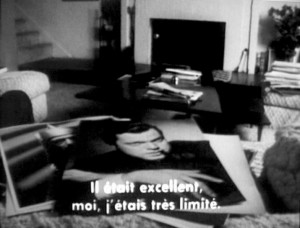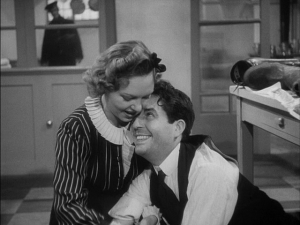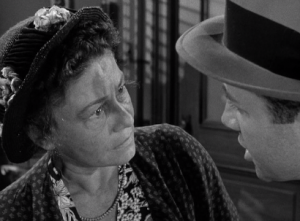From Cinema Scope #18 (Spring 2004). — J.R.
First of all, the good news:
After my announcement in this magazine three years ago that the original negative of my all-time favorite Hong Kong feature (1992) was destroyed, and that the two-and-a-half-hour original version was virtually lost (see “Stanley Kwan’s Actress: Writing History in Quicksand,” Cinema Scope issue 7, spring 2001 —- about to be reprinted in my collection Essential Cinema, with the same misinformation), this ideal version has just come out on DVD in France, under the title Center Stage, in a lovely two disc-set distributed by Universal Pictures Video.
The bad news? It’s subtitled only in French — although an interview with Kwan comprising the only bonus, on the second disc, is conducted in English and can easily be followed that way.
Also subtitled in French —- or in French without subtitles —- are invaluable DVDs included in the last three issues of Bernard Eisenschitz’s indispensable, lavishly illustrated (and therefore pricey) two-issue-a-year journal Cinéma, published by www.leoscheer.com. Issue 05 (printemps 2003) has a restoration of a surviving fragment from Kenji Mizoguchi’s La marche de Tokyo (1929); 06 has two late TV documentaries by Jean Eustache, Offre d’emploi (1980) and Le jardin des délices de Jerôme Bosch (1979); and 07, scheduled to appear this spring, will have my all-time favorite Iranian film, Forough Farrokhzad’s 1962 La maison est noire, as well as Ebrahim Golestan’s 1959 Un feu, which she edited. (The former is also supposed to be coming out at some point as The House is Black, with English subtitles, in a slightly shorter version, from Facets Video.) [2014 note: It did come out, and remains available, but the French version, though harder to come by, is far superior.]
A few other mixed bags:
Chantal Akerman’s similarly unsung Night and Day, released the previous year, is also out on DVD, and with optional English subtitles, but only on a Hong Kong label. (I ordered my copy from the useful www.pokerindustries.com [2014: no longer fuctioning, alas], where you can also order several Ozu films on another Hong Kong label —- again with English subtitles, although not always literate ones.)
No less than 63 Tex Avery cartoons, all made for MGM in the 1940s and 1950s, along with three others from the preceding period at Warners, have been released by the Warner Brothers label in France in a four-disc set that includes some original animation sketches as bonuses. You can watch these shorts in the original English or in the (remastered) French-dubbed versions, with or without French subtitles. The only hitch is the censorship of various politically incorrect (i.e., racist) details in several cartoons and the deletion of at least one entire cartoon (the 1947 Uncle Tom’s Cabaña) for the same reasons — understandable yet lamentable for its doctoring of the historical record, and not even consistent insofar as the dumb- Indian caricatures of Big Heel-whatha (1944) are left intact.
There’s a two-disc set devoted to Howard Hawks’s The Big Sky that I just acquired from a German label on the German Amazon web site (look for Der Weite Himmel). It contains a crummy print of the original release version, a better print of the shorter and better-known version, and an audiovisual essay by Tag Gallagher working from variable prints that expounds on both the differences between the two versions and what’s “typical” of Hawks films in general. All of these are available in English, but when it comes to an interview with Hawks that’s also included, the German voiceover makes it impossible to follow the original English. (There’s also the novelty of German trailers for High Noon and all three films in John Ford’s Cavalry trilogy.)
***
At a multifaceted tribute to Abbas Kiarostami held in Turin, Italy last fall, I was able to see the first half-hour of Kiarostami’s own 90-minute documentary feature about the making of 10, made as a bonus for the French DVD of 10 planned by MK2 (whose two-disc set for The Wind Will Carry Us is exemplary, especially for Yuji Mohara’s 90-minute A Week with Kiarostami). Perhaps the most interesting aspect of the portion I saw is Kiarostami’s explanation of why he favors shooting in DV, which I was ironically seeing around the same time Kiarostami was telling me that he was now planning to shoot his next feature in 35 mm. A subsequent delay in the release of this DVD was occasioned by Thierry Frémaux, the director of Cannes, viewing this entire documentary at Turin and deciding to premiere it at his festival in May —- thereby obliging all the rest of us to wait at least another six months before the film and its equally long “making of” documentary becomes available on an MK2 DVD.
***
A 60-page section about DVDs in the Décembre 2003 issue of Cahiers du Cinéma (no. 585) — clearly reflecting the long-term interest in that subject of the magazine’s new editor, Jean-Michel Frodon —- includes, in addition to such enthusiastic essays as Gallagher on DVD criticism (“Enfin, la caméra-stylo du critique”) and Alain Bergala on pedagogical employments of same (“Eloge des morceaux choisis”), a blistering attack on Criterion by André S. Labarthe that is worthy of some notice. Since the 60s, Labarthe and the late Janine Bazin (widow of André) oversaw and worked on a truly remarkable series of TV documentaries on filmmakers, known successively as Cinéastes de notre temps and Cinéma, de notre temps, that has never been adequately exposed outside of France. At one time or another, figures as important as Noël Burch, Eustache, and Rivette, among many others, worked on these films. Some are fascinating forms of mimetic criticism that consciously ape the styles of their subjects (like those on Cassavetes, Sternberg, and a perverse and semifictional feature-length segment on Welles); others are fascinating as singular documents (such as a dialogue between Godard and Lang that is included on Criterion’s DVD of Contempt); more generally, most of them clearly deserve to be considered as films in their own right. But the policy of some Criterion producers to pull excerpts from these works as if they were rushes, ignoring the value of their original placements, combined with the effacement of Bazin’s name in some of the accompanying credits, represents for Labarthe a demeaning exploitation and diminishment of some of the original works.
Should one be grateful for the DVDs that make portions of these documentaries available, or resentful for the disrespect sometimes shown to their sources and complete versions? Or should one feel some of both? Obviously each case deserves to be judged on its own merits, but one has to concede that Labarthe has a point. The fact that a recent French three-disc set devoted to 60s Pasolini and containing four features and three shorts (with only French subtitles, alas) also makes room for the entirety of Jean-André Fieschi’s Pasolini l’enragé, one of the best known of the Labarthe-Bazin documentaries, is surely significant, because the odds of such a work surviving complete on an American DVD are clearly less high.
***
Now for an even more troublesome mixed blessing. A company called 5 Minutes to Live (www.5MinutestoLive.com) [2014: now apparently and quite fortunately defunct] offers DVDs of the following rare and precious items, among others (to cite only those I’ve ordered myself): Chantal Akerman’s Jeanne Dielman, Robert Bresson’s Trial of Joan of Arc and Four Nights of a Dreamer, John Byrum’s Inserts, Charles Burnett’s Killer of Sheep, Samuel Fuller’s White Dog, Jim Jarmusch’s Permanent Vacation (packaged with his first two Coffee and Cigarettes shorts), William Klein’s Mister Freedom, Richard Lester’s The Bed-Sitting Room, Barbara Loden’s Wanda, Otto Preminger’s Angel Face, Where the Sidewalk Ends, and Skidoo, and Peter Watkins’ Privilege. All the foreign language films on this list are subtitled in English. But some of the prints used are awful (those of Jeanne Dielman and Killer of Sheep seem especially egregious, and Skidoo is panned and scanned), many are mediocre at best, the transfers are basically home-made, and apparently all of them are pirated. This raises the vexing issue of whether it’s better to settle for these versions or none at all —- an ethical as well as practical question that has to be answered by each consumer as long as these titles remain available. (The only one of these films I’ve ever seen on DVD elsewhere is Angel Face, which used to be on a more legitimate French label.) For myself, given the unlikelihood of many of these films ever becoming available on DVD any other way, it’s an extremely tough call. [2014: Happily, most or all of these films are now available in legitimate and decent versions.]
***
On a cheerier note, let me conclude by citing several releases that I feel nothing but positive about. Two recent treasures on Milestone are Norman McLaren: The Collector’s Edition (a bilingual set offering 14 choice shorts on one disc and Donald McWilliam’s documentary Creative Process on the other, as well as a book compiled by McWilliams, Norman McLaren on the Creative Process) and Mad Love: The Films of Evgeni Bauer, including three short features from pre-Revolutionary Russia —- Twilight of a Woman’s Soul (1913), After Death (1915), and The Dying Swan (1916) —- and a 37-minute audiovisual essay by Yuri Tsivian that is every bit as illuminating as Tsivian’s previous historiography on DVDs of Ivan the Terrible (Criterion) and Man with a Movie Camera (Kino).
On Kino again, there’s a superb edition of one of my favorite 30s musicals, Love Me Tonight, bursting with informative extras, and two of my favorite Middle Eastern features — Ferid Boughedir’s splendidly sensual and Tunisian Halfaouine: Boy of the Terraces (1990), paired with his useful documentary Caméra Arabe, and Michel Khleifi’s Palestinian Wedding in Galilee (1987), paired with Khleifi’s half-hour documentary Ma’loul Celebrates its Destruction, which I haven’t yet had a chance to watch.
On Criterion, four notable recent releases should be mentioned. A two-disc set devoted to Jean Renoir’s The Rules of the Game (1939) offers so much scholarly and critical material, including the history of this masterpiece’s initial release and restoration, that it at least carries the illusion of being definitive. Among the many expert contributors are Renoir himself, Henri Cartier-Bresson, Christopher Faulkner, J. Hoberman, Kent Jones, Jacques Rivette (though, alas, only excerpts of his 1966 documentary about the film in the Labarthe-Bazin series are included), Alexander Sesonske, Bertrand Tavernier, David Thompson, Franςois Truffaut, and Wim Wenders.
Henri-Georges Clouzot’s unjustifiably vilified Le corbeau (1943), one of the creepiest portraits and reflections of the French Occupation, comes with a new print essay by its most eloquent English-language defender, Alan Williams (who labels it “the first classic French film noir”), translations of two post-Liberation French articles about the film, a video interview with Tavernier, and excerpts from a 1975 French documentary that interviews Clouzot. Robert Bresson’s Diary of a Country Priest (1950), originally slated to include outtakes, wound up removing them prior to release at the insistence of Bresson’s widow, but still features a commentary by Peter Cowie that manages to be both personal and informative. Finally, Samuel Fuller’s Pickup on South Street (1953) benefits from two snappy and street-smart Fuller commentaries —- one in a Labarthe documentary (apparently complete) that shows him kibitzing on the film’s first reel at a movieola, the other in a more recent Richard Schickel interview —- and trailers from no less than eight Fuller features. Too bad that they didn’t include the one from Underworld, U.S.A. that he introduces himself, but you can’t have everything.


